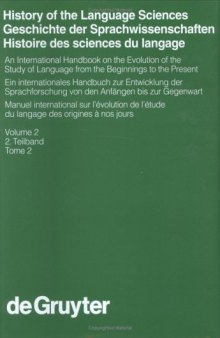 جزییات کتاب
جزییات کتاب
Volume 2 treats, in great detail and, at times quite innovatively, the individual stages of development of the study of language as an autonomous discipline, from the growing awareness in 17th and 18th century Europe of genetic relationships among a host of languages to the establishment of comparative-historical Indo-European linguistics in the 19th century, from the generation of the Schlegels, Bopp, Rask, and Grimm to the Neogrammarians and the application of the comparative method to non-Indo-European languages from all over the globe. Typological linguistic interests, first synthesized by Humboldt, as well as the development of various other non-historical endeavours in the 19th and the first half of the 20th century, such as language and psychology, semantics, phonetics, and dialectology, receive ample attention.



 دانلود کتاب
دانلود کتاب

 جزییات کتاب
جزییات کتاب


 این کتاب رو مطالعه کردید؟ نظر شما چیست؟
این کتاب رو مطالعه کردید؟ نظر شما چیست؟
